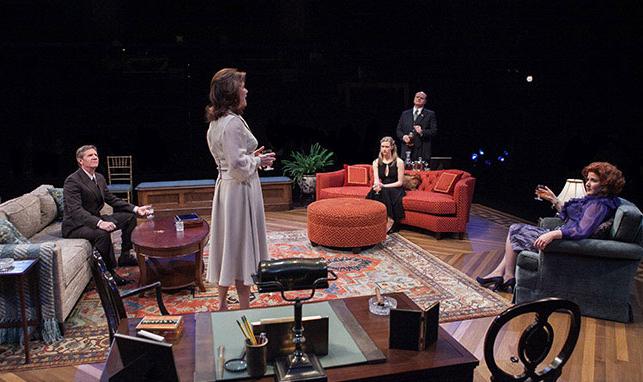‘City of Conversation’: An Echo and Warning on Political Passions
By • March 18, 2016 0 1366

“The City of Conversation,” Anthony Giardina’s play set in the politically atmosphered home of a Georgetown hostess — from 1979 to 2009 — is a play that, in and of itself, reads surprisingly well. It’s witty, sharp, smart, full of sometimes daggered bon mots and a plot that has its revealing twists and turns.
Yet the current Arena Stage production in the Fichandler reveals something else about the work: it plays really well on the stage as a very human family drama, as a political comedy-drama that echoes mightily in these crazed primary times, and as an evocation of halcyon days in Georgetown when women like Hester Ferris, an avowed liberal player, presided over dinners that might decide the fate of bills making their way in committees in Congress, or larger issues, like Supreme Court nominations.
Viewing the play, you get what’s not on the page—the raised eyebrows, the pauses between the launching of a sharp barb is launched and when it lands, the texture of language as a kind of combat and the emotional and dexterous back-and-forths that reference political leanings and social and financial classes.
The play occurs within three economically written and emotionally punchy settings. It opens with President Jimmy Carter’s infamous or famous — depending — “malaise” speech in the background, even as the players on hand talk about Senator Ted Kennedy’s impending run for the presidency. The middle—and most acidic and personally combative—phase occurs during the zealously partisan battle over the nomination of Robert Bork to the Supreme Court during the Reagan Administration. The end game, elegiac and surprisingly almost sentimental, occurs on the day of Barack Obama’s historic inauguration as President of the United States.
Phase one introduces us to the primary combatants. Hester Ferris is having one of her famous dinners at which she hopes to persuade a Kentucky senator to sign on for Kennedy’s proposal to have some Southern judges disavow their membership in private clubs that bar African Americans from membership. Her son Colin arrives unexpectedly a day early from London, his fiancé and fellow London School of Economics student Anna Fitzgerald in tow. Ann bluntly states her ambitions for a Washington career and offers to study Hester as a way of learning about the city’s and Georgetown mores. “Oh, I’ve seen that movie before,” retorts Hester, referencing “All About Eve.” Ann — along with Colin — is a budding member of the new, conservative energy, which affronts the true-blue, iron-fisted Kennedy liberal. The dye is cast when Ann, a la Sally Quinn, invades the cigar-smoking domain of the after-dinner, usually men-only part of the evening and does so with aplomb and blonde charm — so much so that it costs Hester her Kentucky ally.
Things come to a full head of bile in act two, when Colin and Ann, now married, have left their young son in the care of his grandmother, a Hester fully involved on the opposite of the Bork battle. The living room, when all (most of it pitiless and vicious) has been said and done, has become a personal battleground over politics with the grandson as a kind of hostage.
At this point, you can see the personal cost of politics for Hester, who makes a tragic sacrifice, and for Anna, a ranking GOP lawyer, who is so involved in the battle that she can’t abide the thought of losing. These, we see, may be the roots of the great political divide that’s in our political life and shown on our screens almost nightly — a divide that’s become as irreconcilable as the split between Hester and her family.
Margaret Colin as Hester has to carry the show—with her home as its center revealing her views and her heart. She has plenty of both—and must dominate.
Colin does this with uncommon strength married to a flirtatious confidence—the character is having a long-standing affair with a married senator. She also has a worthy opponent in Anna, played with a sexy ferocity by Caroline Hewitt. Michael Simpson has the more difficult and less flamboyant task of not only playing Colin, but also Colin’s son, both diffident men with limitations not shared by the women they love—be they mother, wife or grandmother. Ann McDonough gets a lot out of the somewhat mysterious and self-contained role of Jean Swift, Hester’s ever-present, not quite long-suffering sister and companion in tightly held liberalism.
If the first two acts, swiftly and toughly paced by director Doug Hughes, are portraits of intimate political and family battles, the final act is something else again. It is Hester at twilight, her great battles over and seemingly won with Obama’s inauguration. But she is also alone with Jean, as her grandson Ethan and his partner Donald, a historian, arrive. The battle has cost Hester her family, and this is the first sight she’s had of her grandson. This last scene is almost a self-contained playlet, a sweet, awkward scene full of small tendrils of hope and echoes of the past (as well the future). Hester’s home—full of artifacts, letters and photograph—has become a kind of museum of the political heyday of liberalism.
In this way, “The City of Conversation” strikes a loud echo and sends a warning of the cost of political passions held too strongly. You don’t, after all, have to be suicidal to still suffer the pain of self-inflicted wounds.

